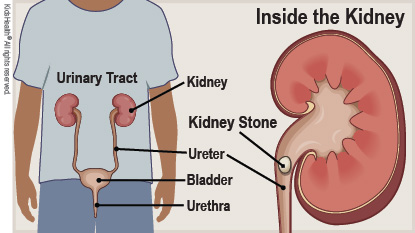Kidney Stones: How to Care for Your Child
Kidney stones happen when minerals form crystals inside the kidneys. There they get bigger and become kidney stones. Kidney stones can get stuck in the kidney or they can travel out of the kidney into the ureter (the tube that connects the kidney to the bladder). Most stones cause problems like side pain and blood in the urine (pee). Some stones also can block the flow of pee. Pain medicine and plenty of fluids help kids get better without long-term problems.


Pain
Strain your child's urine
-
A stone that is caught in a strainer can be tested to see what type it is. Knowing that can help doctors find the cause and prevent other stones.
-
If the care team did not give you a strainer, you can buy one at a medical supply store or use a coffee filter.
-
Place a urinal in the toilet. This typically fits under the top lid of the toilet. If a urinal isn't available, have your child pee into a clean container and pour the liquid through the strainer.
-
Each time your child pees, pour the urine from the urinal or container through the strainer. The stone should be visible after the urine is strained. Collect any kidney stones left after straining. If the stone was crushed before your child passed it, there may only be fragments of the stone in the strainer, but collect them all for testing. Help your child pee through the strainer or mesh until the stone passes or at least until the pain eases, which may take 1 to 2 weeks.
-
If your child passes a stone, let it dry on a paper towel. Save it in a clean container and take it to the doctor's office.

Your child:

Your child:

Why do kids get kidney stones? Most kids who get kidney stones have a health condition that increases their chances of getting them. Other things that can make a kidney stone more likely are:
-
not drinking enough water
-
eating too much salt
-
not having enough citric acid (the acid in citrus fruits such as oranges) in the urine
-
having too much calcium in the urine
Can kidney stones be prevented? It's not always possible to prevent some types of kidney stones. Kids who've had kidney stones should:
-
Drink a lot of liquids throughout the day. If their pee is almost clear, that's a sign they're drinking enough. Ask your doctor how much your child should drink.
-
Avoid sodas, soft drinks, and sports drinks.
-
Limit the salt and protein in their diet.
If these changes don't prevent kidney stones, medicines can help.